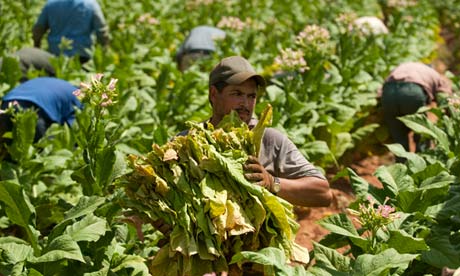Tobacco farm workers in North Carolina.
"Parker seems to believe tghat that the allures of unregulated capitalism have, over the past 30 years, torn apart the old social contract. Sadly, the idea that we each are essentially on our own to forge a life desting might be the one belief that we all agree on."
***
"The Motto of The Republican Party: We are all in this... alone..." Senator Dick Durbin
A profile of ordinary lives provides a powerful portrait of the US.
The Unwinding is the right title for George Packer's epic, sad and unsettling history of the last four decades in the US. His topic is the coming apart of something in the national fabric: the unravelling of unspoken agreements about the limits to Wall Street's greed; about what a congressman would or wouldn't do for the right price; about what a company owes its workers, or what the wealthy should contribute in tax.
The result of all this unwinding is more personal freedom than ever before: "Freedom to change your story, get your facts, get hired, get fired, get high, marry, divorce, go broke, begin again, start a business, have it both ways, take it to the limit, walk away from the ruins, succeed beyond your dreams." But it is the loneliest sort of freedom. What Packer's disparate characters share – as his narrative moves up and down the spectrum of inequality, from inner-city Ohio to Silicon Valley, to the exurban McMansions of Florida, to Washington's corridors of power – is that each is fundamentally on his or her own.
Packer's history isn't a matter of abstract politics or economics: there's almost no big-picture analysis of forces such as deindustrialisation, the neutering of unions, recessions, dotcom bubbles, the financial crisis and the rest of it. Instead, he tells his story mainly through five central characters (although one of them isn't a person). They are the entrepreneurial son of a failed tobacco farmer; the black daughter of a heroin addict, growing up in the Rust Belt; an initially idealistic aide to Joe Biden; the billionaire founder of PayPal; and Tampa, in Florida, one of the focal points of America's real-estate delirium, and of the Tea Party that delirium helped create.
Packer, a New Yorker staff writer, weaves back and forth between them, interspersing these intimate profiles with collages of news headlines and brief, sometimes scathing biographies of the public figures of the time, among them Oprah Winfrey, Sam Walton of Walmart, Jay-Z, Newt Gingrich and Colin Powell. (The structural echoes of the U.S.A. trilogy, by John Dos Passos, are conscious and acknowledged in an endnote.)
Few of Packer's characters are easily categorised as Democrats or Republicans, hopeful or despairing, or winners or losers, which helps make their stories absorbing. Dean Price, the farmer's son, starts adulthood as a Reagan supporter, opens a handful of fast-food restaurants, then glimpses the future in biodiesel and recycled cooking oil and briefly becomes a green-energy hero, meets Barack Obama and votes for him, but sinks back into bankruptcy and apocalyptic visions of America once the oil runs out. Tammy Thomas, the addict's daughter, loses her job at the auto-parts factory in Youngstown, Ohio, but surprises herself by becoming an energetic and effective community organiser, campaigning to bring her hollowed-out town back to life. Peter Thiel, the Silicon Valley tycoon, seems the most obvious winner, but he's too restless to settle for a life of luxury. Concluding that the internet revolution is empty at its core, he plunges into schemes for overcoming death. Or, failing that, for floating libertarian colonies on the high seas that would leave the rabble behind: in Thiel's view, democracy poses a grave threat to the future of capitalism.
Some of The Unwinding's most vivid scenes concern Jeff Connaughton, a politics nerd from Alabama who is 19 when he first spies Joe Biden, then a youthful senator, and becomes a lifelong "Biden guy", hitching his wagon to the future vice-president, despite all obstacles – not least Biden himself, who emerges from this book not as garrulous and folksy but as self-obsessed and ungrateful. ("Jeff, don't take this personally," an old Biden hand tells him, after the senator refuses to repay years of loyal sweat with a single phone call to commend Connaughton for a job. "Biden disappoints everyone. He's an equal opportunities disappointer.")
As an aide to Biden in various capacities, Connaughton watches Washington slough off the last vestiges of the pretence that politics isn't all about the money. Then he sells out, too, becoming a wealthy lobbyist, but he's no good at suppressing his ethical impulses: by the end, with Biden as vice-president, we find Connaughton living far from DC, nursing his sick dog and writing a book to be entitled The Payoff: Why Wall Street Always Wins.
The futile philosophy of positive thinking runs through these characters' lives: thrown back on their own resources, Packer's Americans naturally gravitate towards the notion that they can triumph over social and economic hurdles by sheer force of will. Dean Price's bible is the Depression-era classic Think and Grow Rich, by Napoleon Hill; another character sees her scant savings vanish into a scheme run by the "founder of the Mastermind Forum [and] onetime associate of the motivational speaker Anthony Robbins". And in Packer's short sketch of her career, Oprah Winfrey is seen promoting the poisonous notion that "being all you can be" is a simple matter of deciding. "Since there was no random suffering in life," Packer writes, encapsulating the Winfrey philosophy, "Oprah left [her viewers] with no excuse."
In Tampa, we follow a dogged newspaper journalist, Michael van Sickler, as he travels through the surreal landscape of the Florida mortgage crisis, visiting "ghost subdivisions" full of foreclosed homes, then following the trail to the banks who had "thrown money at fraudulent borrowers to overpay for crappy houses because the risk was immediately passed on to someone else". (At one development, named Carriage Pointe, he finds emaciated cows wandering between the empty houses, brought in so that someone could claim an agricultural tax break, then left to starve.) We sit in on a county courtroom, where foreclosures are processed at the rate of 120 per day.
We watch fear and resentment give rise in Tampa to a particularly energetic chapter of the Tea Party movement. The group then proves instrumental in defeating a light rail scheme that might have given the city a future – but which smacks, to them, of "European-style socialism, a society in which people were forced to share public services with strangers and pay for them". This is collective grassroots endeavour aimed at reasserting isolation, and it's the only kind, this book leaves you thinking, that ever really succeeds.
Packer subscribes to the American journalistic doctrine that the reporter must never appear in the narrative, and his absence is sometimes distracting. Does the wary elderly white woman allow the black community organiser over her threshold because racism in Youngstown is giving way to solidarity – or because Packer is standing reassuringly on the doorstep, too? We can't tell. Meanwhile, his decision to end on a note of uplift feels slightly forced. Yes, Tammy Thomas has found her vocation, and Dean Price's dreams are undimmed. But there is not much else to be optimistic about. It's as if Packer himself couldn't completely resist the helium platitudes of Napoleon Hill.
But it is a testament to Packer's talents that The Unwinding is powerful, rather than off-puttingly earnest or just depressing, and that it lingers so long after reading. The sense of loneliness – of isolated souls, failed by their institutions, pummelled by the forces of big money – seems to seep under your skin, and to stay there. On finishing the book, the reader might be forgiven for feeling the urge to follow the example of Connaughton, who, after leaving his last job in DC, flew straight to Costa Rica, went on an eight-hour hike, then returned to his hotel and "turned on the shower and got in without taking off his clothes, standing under the stream and letting it soak him and soak him until he felt clean".• Oliver Burkeman's The Antidote is published by Canongate





















